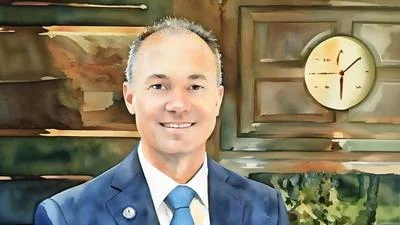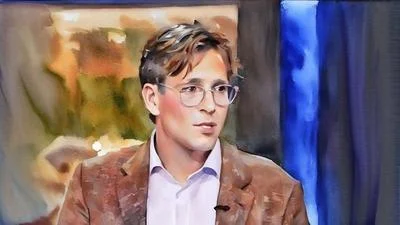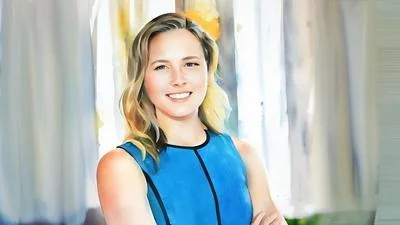Dr. Eric Patterson, president and CEO of the Victims of Communism Memorial Foundation, is a foreign policy expert who focuses on combating totalitarianism. He offered Federal Newswire his take on the Russia-Ukraine war.
A former president of the Religious Freedom Institute and a former dean at Regent University, Patterson’s government service includes tenure as a White House fellow at the State Department and over 20 years as a commander in the Air National Guard. He has authored 20 books on the moral dimensions of national security and international affairs.
On the war, Patterson says Ukraine’s distinct cultural identity is central to the conflict. “Ukraine is a thorn in the side of Vladimir Putin by their very existence, without threatening in any way,” he says.
He says that Russia desires to dominate the region for a few important reasons. “Part of it’s the desire to have control over natural resources that are there, and part of it is to not allow countries that were formerly in the Russian or the Soviet orbit to lean more and more towards the West as democracies and free-market economies tied to Western countries.”
But he says the war is not just geopolitical, it also has a spiritual dimension. “There are religious and spiritual elements here on both sides,” he says. “Ukraine has been far more religious over the past century than the Russian people—maybe five to one in terms of population’s religiosity.”
Ukraine’s religious identity is defined by a unique “dynamic denominationalism,” where Ukrainian Greek Catholics, Orthodox Christians, Baptists, Pentecostals, Jews, and Muslims coexist and practice their faith freely. This pluralism, Patterson argues, makes Ukraine distinct from Russia, where religion has been co-opted by the state.
“Vladimir Putin has used religious symbols and religious themes and practices, holidays, and observances to buttress a new Russian nationalism,” he says, noting how the Russian Orthodox Church has even called Russia’s invasion of Ukraine a “holy war.”
During his recent visit to Kyiv, Patterson observed the religiosity and resilience of the Ukrainian people. “I saw faith-based organizations, many, many churches, and people trying to not just worship in terms of Sunday or going to Mass, but also people driven by their faith to serve the most vulnerable around them,” he says. This stood in stark contrast to what he had expected based on certain Western narratives about Ukraine’s supposed progressivism. Instead of the “symbols of progressivism” seen in Western European cities, he encountered a faith-driven society committed to helping those in need.
Patterson also draws comparisons between the daily reality in Ukraine and that of Israel, where citizens live under constant threat of attack. “In my experience going to Kyiv, it’s the same elements,” he says, describing how Ukrainians track missile threats through phone apps and live with the constant fear of bombardment. He says the severity of Russia’s actions can be seen by the country’s abduction of 20,000 Ukrainian children. “America’s about eight times bigger than Ukraine was before the war—if we lost 160,000 American boys and girls, how would we respond to that?”
Patterson connects Putin’s past as a KGB officer to his authoritarian tactics. While he does not believe Putin is a full-fledged communist ideologically, he asserts that the Russian leader operates using the communist playbook. “It’s driven by the state, and it’s perfectly fine to use torture, intimidation, and suppression to get what you want,” he says. “All of the tactics, all of the assumptions about how communism operates—that’s the playbook of Vladimir Putin.”
Patterson would like to see greater American support for Ukraine that would lead to stability for the nation. “No one is asking for American boots on the ground,” he says. Instead, he argues that the focus should be on securing enduring security guarantees for Ukraine, similar to how South Korea has thrived under a military armistice. “Ukraine needs an enduring set of security guarantees to be able to go forward in the future and not fear another Russian attack next summer or the year after.”
Patterson suggests that future negotiations might involve broader geopolitical trade-offs, such as concessions regarding Iran or Venezuela. “Does the White House see this as part of a larger grand bargain?” he asks, speculating that Russia might be willing to abandon its support for other adversarial regimes in exchange for a more favorable settlement in Ukraine.
He also points out that the war has reshaped global alliances. “The Baltic countries have finally fully gotten off the Russian energy grid–even Germany has moved away from energy dependence on Russia,” he says. He believes that leveraging Ukraine’s vast reserves of rare earth minerals and energy resources could counteract Russian and Chinese dominance in these critical sectors. “Having Ukraine oriented towards the West is a huge win, not just for Ukraine, but for the entire Western alliance.”
Patterson has great respect for the resilience of the Ukrainian people. “The sense of patriotism and courage that’s expressed in their music is quite astonishing,” he says, describing the role that national songs play in maintaining morale. He is particularly moved by the plight of war-torn families. “Parents who lost children, children in orphanages that have lost their parents, visiting a women’s shelter—seeing the brokenness of war but also the resilience of Ukrainians has been inspiring.”
For Patterson, the European war is about more than territorial integrity. He sees Ukraine as defending the values of democracy, religious freedom, and national sovereignty. “Russia’s an enemy of the West,” he says. “The Ukrainians are fighting a war for NATO’s eastern flank. It is in our interests to help them.”









